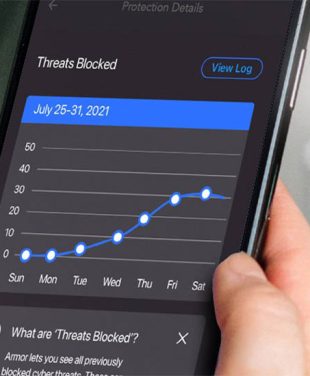NETGEAR and Bitdefender, the global leader in cybersecurity software, have joined forces to investigate the security risks facing today’s smart homes and what we can expect in the future. We reviewed threat data from the 3.8 million homes around the world protected by NETGEAR Armor™ Powered by Bitdefender® and investigated about 50 million IoT devices generating more than 9.1 billion security events to uncover the most common vulnerabilities and attack scenarios to help make homes and families safer environment for everyone.
Here’s a shocking look at what the 2024 IoT Security Landscape Report reveals:
- Every 24 hours, home network devices see an average of 10 attacks.
- Every 24 hours, Bitdefender smart home security solutions block an average of 2.5 million threats, or roughly 1,736 threats per minute.
IoT at Home
By now, IoT or Internet of Things has become a familiar term. It refers to a network of physical objects that contain software, sensors and other mechanisms for exchanging and connecting data with other systems and devices over the internet. Think of an IoT device as anything that is marketed as “smart,” but what makes things like light bulbs and doorbells smart can also make them a threat to your security.
According to Fortune Business Insights, the U.S. IoT market is set to surge by 24.7% by 2030. That’s a projected growth from $118.24 billion in 2023 to $553.92 billion. This represents incredible new capabilities and opportunities for business, but it also impacts the home. A typical home today has an average of 21 devices connected to the home network. These are things designed to enhance convenience, security, energy efficiency, and comfort, and make both personal and work-from-home life a little easier, safer, and perhaps enjoyable. These include phones, computers, gaming consoles and TVs, of course, but also speakers, baby monitors, security cameras, appliances, toys and beyond. In fact, it’s hard to think of an electronic gadget that doesn’t have some kind of internet connectivity, and every year we buy more and more.
While all these devices are made to enhance our daily lives, they also expose us to potential cyber-threats that could be leveraged to compromise your network, leading to a loss of service or a breach of your personal information. These devices get added to home networks and function there for years, rarely getting updated or patched. Unlike PCs and other personal devices, you can’t load antivirus or security software on a smart thermostat. Each connected device can act as a backdoor to your network, making it vulnerable to intrusion.
IoT Threat Data
In 2023, the highest number of vulnerabilities were discovered in TV sets (34%), smart plugs (18%), digital video recorders (13%), and routers (12%). In fact, vulnerabilities in TVs are quite common, largely because they’re used in a home for a long time and often, are very rarely updated, and function well beyond their support windows. The same can be said for other devices that people keep in their homes for many years.
IoT devices have different functions or hardware capabilities and therefore, different threat models. Some devices are connected to the network and wait for instructions, while others are always on, sending and receiving data. Of the vulnerabilities discovered in the study, the two most common types are buffer overflow (28.25%) and denial of service (27.20%). Next in line is code execution, gain privilege, memory corruption, and information leak.
While less common than overflow and denial of service, code execution and privilege vulnerabilities pose significant risks due to their potential to give attackers access and privileges on compromised devices. In other words, this leads to unauthorized access, data breaches, and system compromise.
Regardless of how many potentially vulnerable devices are used at home or what type of attacks may happen, robust IoT and router security can help.
Managing IoT Security At Home and On-The-Go
Protecting all your devices both at home and on-the-go can feel overwhelming. That’s why an all-in-one security solution is essential for peace of mind. NETGEAR Armor™ Powered by Bitdefender provides an added layer of protection for your home network and devices. Many of our latest Nighthawk routers and Orbi mesh systems come with either a 30-day trial or a free one-year subscription.
Think of NETGEAR Armor like the front door lock to your home network, but it keeps hackers from stealing sensitive data like passwords, credit card or social security numbers. NETGEAR Armor comes pre-built into the router as a shield for your entire home. It protects computers, mobile phones, security cameras, baby monitors and other IoT devices on the network.
It also features an integrated VPN and computer and mobile device apps that safeguard your privacy and security while on the go and connected to unsecured networks. The NETGEAR Armor app can be installed on any Windows PC, macOS, Android, and iOS personal devices (up to 50) for an extra layer of cybersecurity and antivirus protection wherever you may be. It will detect and block viruses, spyware, ransomware, malicious links, and other Internet scams before they even reach you, not to mention it will instantly block harmful ads or webpages that could contain malicious content.
With the visibility and added protection across all your devices, families can simply use NETGEAR Armor to cover it all and say goodbye to multiple antivirus subscriptions.
Elite Router Protection
NETGEAR Armor prevents your IoT devices from reaching out to rogue servers and protects all your devices from outside intrusion, but what about the router itself? Routers can also be a target for attacks, making top-of-the-line security imperative.
Powered by state-of-the-art encryption protocols and advanced threat detection mechanisms, NETGEAR routers stand as the first line of defense against evolving cyber threats and include security features such as automatic firmware updates, VPN support, cutting-edge WPA3 security, access control, third-party testing, and separate IoT and guest WiFi networks.
The latest Orbi 770 series is the first product to have an additional layer of security with the new Advanced Router Protection feature, only available from NETGEAR. This feature protects the router from not only known threats but also from most unknown threats using a combination of AI heuristics and advanced exploit prevention to recognize and block exploitation attempts.
It also enables the capability to quickly release live patches for threats without needing to wait for a new firmware release. This significantly improves response times compared to the traditional method of releasing firmware updates for each specific router model and further strengthens our commitment to provide industry leading security protection for our router/mesh products from cyberattacks.
Advanced Router Protection, which has been developed in partnership with Bitdefender, will be rolled out to the rest of the NETGEAR WiFi 7 router lineup later this year.
Cyber-threats are abundant and as technology advances so do cybercriminals’ techniques. Over time, attacks have become more persistent and sophisticated. What’s at risk is vital but you don’t have to be an IT or security expert to protect yourself and your family. You can rely on comprehensive security solutions from NETGEAR and Bitdefender to stay a step ahead and keep you safe.




